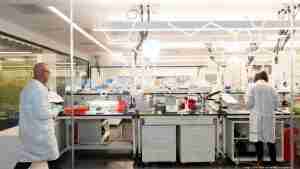
An Inside Look Into the Jefferson Institute for Bioprocessing’s Hands-On Biotech Training
By Mark Terry
March 21, 2023
As the life sciences industry continues to grow in and around Philadelphia, many of the regional educational institutions have risen to the occasion by creating educational and training programs that prepare graduates for jobs with these companies. One such program is the Jefferson Institute for BioProcessing (JIB), part of the Kanbar College of Design Engineering & Commerce at Thomas Jefferson University in Philadelphia.
Geoffrey Toner, MS, MB(ASCP), Director of Curriculum Development, Instructor, MS Program Director, took time to speak with BioBuzz about the program.
“We are Jefferson’s first academic business unit,” Toner said. “Academically, we reside within the College of Engineering, part of the engineering program. And on the academic end, our goal is to supply the biopharmaceutical industry with a steady supply of well-trained and prepared talent.”

Toner notes that traditionally, the industry looks for students that are chemical engineers with a history in biology and chemistry. “But outside of chemical engineers, these students really don’t have a good, physical or hands-on skill set that can be readily applied to industry. So that’s where we step in.”
In addition to its academic programs, the JIB acts as a contract development and manufacturing organization (CDMO) for companies to partner with for process and product development, and customized training and workforce development. Its facilities include a flexible, single-use facility with BSL1 and BSL2 bioprocessing capabilities.
Toner says, “We work on industry-funded projects, whether that’s in process development, analytical, or maybe they have a new piece of equipment and they need to generate data for a white paper. There are a lot of different areas that we’re working on within that space.”
He notes they were originally founded to specialize in legacy therapeutics, such as monoclonal antibodies and proteins. “But we’ve expanded our capabilities into cell and gene therapies and advanced vaccine manufacturing. Most of that is in the process development or even generating clinical material for Phase I and Phase II trials.”
“We also do industry training,” Toner says. “We work with businesses of all sizes, whether you’re a Fortune 500 company or just trying to enter the market to design customized training courses for that entity only. They are then populated by employees of that company, which gives them a great environment where they don’t have to fear saying something they shouldn’t in front of people from a competing company, like problems they’re having or technical secrets.”
He adds, “We can help them through actual learning and then through problem-solving as well.”
The JIB’s academic programs include:
- An MS in Biopharmaceutical Process Engineering.
- An MS in Advanced Biotherapeutics: Manufacturing & Regulatory Affairs.
- A Certificate in Biopharmaceutical Process Development.
- A BS or MS in Biotechnology with a concentration in Biopharmaceutical Process Development.
- An MBA with a concentration in Biopharmaceutical Commercialization.
- A PhD in Biologics Process Engineering.
The JIB has a large laboratory facility with pilot plant-scale equipment, including bioreactors as large as 200 liters. “They can really gain a firm grasp of the processes involved, from end to end, from cracking the vial all the way to tangential flow filtration, concentration of material, buffer exchange and getting things ready for the next steps of formulation, finish and fill, and things of that nature,” Toner says.
Toner noted that this term, the students were “literally running a production campaign themselves in a group setting. They’re producing a biosimilar using a CHO-based cell line. They’re doing everything through upstream culture, getting into the bioreactor depth filtration all the way through a traditional three-column process for filtration and then tangential flow filtration. They get a great skill set here and that’s really the core of who we are academically now.”
In September 2022, the JIB partnered with Temple University’s School of Pharmacy to create the MS in Advanced Biotherapeutics: Manufacturing & Regulatory Affairs degrees. The hands-on technical end is taught by JIB, while the regulatory is covered by Temple.
In a press statement at the time, Wendy Lebing, Assistant Dean for Temple’s Regulatory Affairs and Quality Assurance program said, “This partnership will help to propel students’ career advancement in these cutting-edge technologies. Students will have the ability to earn certificates from either school while also earning a degree from either Temple or Jefferson, depending upon their preferred area of focus.”
“It’s a natural marriage of what we both do very well,” Toner says.
In discussing more traditional biology, biochemistry or chemical engineering programs, Toner notes that the traditional programs often provide a lot of information, “but the hands-on skill set isn’t necessarily there. So young people today don’t necessarily understand that when you get these degrees, it’s a stepping stone. What’s the next thing? Many think of medical school, but what are the 95% going to do that don’t make it to medical school upon completion of a four-year degree? That’s kind of where we step in.”
Toner emphasizes that the program works hard to stay abreast of what is going on in the industry and to continue to evolve its educational setting. “We want to meet the needs of industry by preparing well-trained candidates for employment. We have to make sure that we’re keeping up with what they want to do in the directions that they’re moving in.”
They also hope to offer their capabilities to other universities. “There is a lot of energy and capital needed to build a facility like this,” Toner says. “Not all universities are going to be able to do that, but they do other things well. So why not take those capabilities here at JIB and combine them with what these other universities do well and find creative ways to build new programs and new programmatic models to offer our capabilities to their students and create new visions for the future?”
The JIB is currently expanding its facilities, which is expected to be completed in June 2023. It’s taking office space and a break room and creating additional laboratory space. Toner says, “We’ll be able to dedicate a lot of that to cell and gene therapy and help to work in process development and the creation of material for early-phase trials. It’ll create more opportunities for our students. Ultimately, we will have equipment on site and capabilities that will help them throughout their careers.”
- About the Author
- Latest Posts
Mark Terry is a freelance writer, editor, novelist and ghostwriter. He holds a degree in microbiology & public health and spent 18 years in infectious disease research and clinical and research genetics prior to his transition to a writing career. His areas of expertise include biotechnology, pharma, clinical diagnostics, and medical practice management. He has written literally thousands of articles, as well as market research reports, white papers, more than 20 books, and many other written materials. He currently lives in Michigan with his family.







